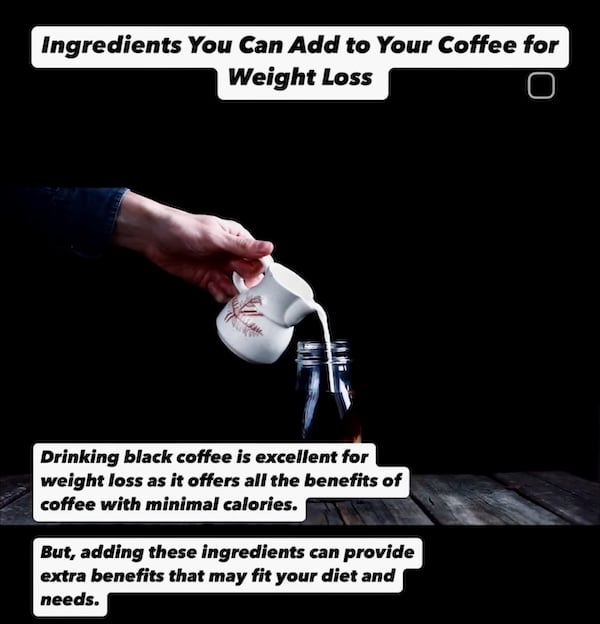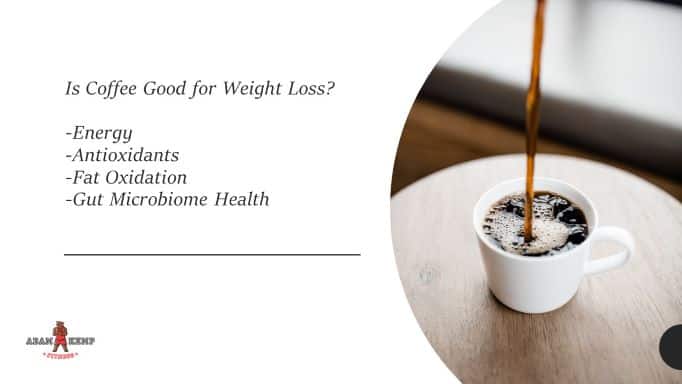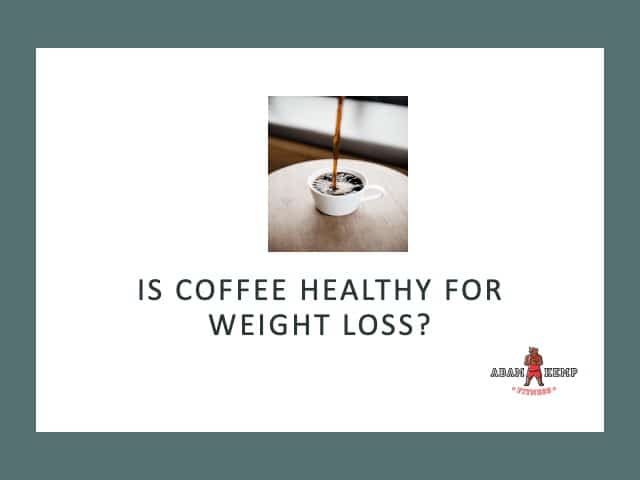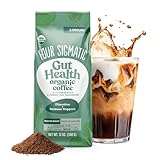Coffee for Weight Loss: Can Coffee Help You Lose Weight?
Drinking coffee for weight loss has become a growing trend as more people have discovered that, beyond providing a quick energy surge, coffee’s caffeine and antioxidant content can play a meaningful role in increasing fat oxidation, suppressing appetite, and improving exercise performance, thus resulting in more weight loss.
Scientific research supports these effects, showing that caffeine increases metabolic rate and mobilizes stored fat for energy use during workouts, potentially leading to greater calorie burn throughout the day (Tabrizi et al., 2019; Ganio, 2009).
Moreover, coffee’s thermogenic properties and influence on appetite-regulating hormones may help control cravings and support a consistent calorie deficit, which is one of the most critical factors for sustainable fat loss.
However, the benefits depend heavily on how you drink it.
Black coffee or minimally sweetened versions provide the metabolic advantages without adding excess calories, while sugary or creamy options can quickly negate their effects.
By choosing high-quality beans and consuming coffee strategically around workouts or meals, you can amplify its fat-burning potential and make it a valuable ally in your fitness journey.
Using coffee for weight loss involves reinforcing healthy weight loss habits with one of the world’s most beloved beverages.
Why is Coffee Good for Losing Weight?

Coffee is good for losing weight because it naturally stimulates your metabolism, enhances fat burning, and improves exercise performance; all without adding calories when consumed black.
The caffeine in coffee activates the central nervous system, increasing energy expenditure and helping the body use stored fat as fuel.
Additionally, coffee contains antioxidants like chlorogenic acid, which may reduce glucose absorption in the gut and help regulate blood sugar levels, both key factors in maintaining a healthy weight.
When paired with a balanced diet and regular physical activity, coffee becomes a simple yet effective tool for improving metabolic health and supporting long-term fat loss goals.
Increased Metabolism
One primary way coffee aids weight loss is by boosting metabolism.
Caffeine, a key component of coffee, is a natural stimulant that enhances the body’s metabolic rate, allowing you to burn more calories even at rest.
Studies have shown that caffeine can increase metabolic rate by 3-11%, with larger doses having a more pronounced effect (Tabrizi et al., 2019).
More Fat Oxidation
Additionally, coffee increases fat oxidation, which is the process where the body breaks down fats to use as energy.
By promoting fat oxidation, coffee supports long-term fat loss, especially when consumed before physical activity.
This effect is amplified during workouts, as caffeine mobilizes fatty acids from fat tissues, allowing the body to burn more fat during exercise (Ganio, 2009).
Appetite Suppression and Caloric Intake Control
Research has demonstrated that moderate coffee consumption reduces caloric intake during subsequent meals, helping individuals consume fewer calories throughout the day (Gavrieli et al., 2012).
Coffee’s ability to suppress appetite is another significant factor in its weight loss benefits. By reducing hunger, coffee helps you maintain a calorie deficit, which is essential for weight loss.
Moreover, the warm and comforting nature of coffee can have a psychological effect, making it easier to avoid unnecessary snacking between meals.
This, combined with the appetite-suppressing qualities of caffeine, makes coffee an effective tool for reducing overall caloric intake and staying on track with dietary goals.
Improved Physical Performance
Coffee doesn’t just stimulate the mind; it also boosts physical performance, making it an excellent pre-workout drink.
Caffeine increases energy levels and reduces the perception of effort during physical activity, allowing you to work out harder and longer.
Studies have shown that caffeine improves endurance, power output, and overall exercise performance, leading to more calories burned (Wang et al., 2022).
Whether you’re hitting the gym or going for a run, consuming coffee 30-60 minutes before a workout can enhance your performance and accelerate weight loss.
Related Reading: Coffee vs Pre Workout: Which is Better Before Exercise?
How Much Coffee to Drink for Weight Loss?

Consuming 2-3 cups of coffee per day strikes a balance between effectiveness and safety.
This amount provides enough caffeine to stimulate metabolism, suppress appetite, and boost fat oxidation without leading to negative side effects like jitteriness, anxiety, or insomnia.
Studies show that doses between 100-400 mg of caffeine (equivalent to 1-4 cups of coffee) offer metabolic benefits while remaining within the safe range for most people.
Exceeding this range may disrupt sleep, impair digestion, and elevate stress levels, ultimately hindering your weight loss efforts.
Best Time to Drink Coffee for Weight Loss
The timing of your coffee intake plays a key role in optimizing its fat-burning potential. Drinking coffee in the morning helps kickstart your metabolism, providing an early energy boost to fuel your daily activities.
Additionally, consuming coffee before workouts (about 30-60 minutes prior) improves exercise performance, increases endurance, and leads to higher calorie burn during physical activity.
This pre-workout caffeine boost mobilizes fat stores, making them more accessible for energy use during exercise, resulting in more effective weight loss over time.
If you drink coffee before a morning workout, you are stimulating your body with exercise and caffeine at the right time of day for maximum weight loss!
How to Optimize Your Coffee for Weight Loss
To fully leverage coffee as part of your weight loss strategy, it’s essential to focus on how and when you consume it. Simple adjustments in your daily coffee habits can significantly enhance its effectiveness in promoting fat burning and curbing appetite.
Below are several practical ways to optimize your coffee consumption for maximum weight loss results.
Ingredients to Avoid Adding to Coffee if You Want to Lose Weight
To keep your coffee weight-loss friendly, it’s essential to avoid calorie-dense additives like sugar, cream, or flavored syrups.
These can quickly turn a low-calorie drink into a high-calorie indulgence, negating coffee’s fat-burning benefits.
Instead, opt for healthier sugar alternatives for coffee that enhance flavor without adding extra calories.
Unsweetened almond or coconut milk provides a creamy texture, while natural sweeteners like stevia or monk fruit offer a guilt-free way to satisfy your sweet tooth.
For those seeking a flavor boost, a small amount of vanilla extract can add depth without the added calories or sugar.
Ingredients You Can Add to Coffee for Weight Loss Support

Certain ingredients can amplify coffee’s fat-burning potential, making it an even more powerful tool for weight loss.
MCT oil is a popular addition due to its ability to quickly convert into ketones, which are a potent fuel source that promotes fat burning, particularly for those following a low-carb or ketogenic diet.
MCT oil also helps curb hunger, keeping you feeling fuller for longer periods.
This concept forms the basis of Bulletproof coffee, a blend of black coffee, MCT oil, and grass-fed butter or ghee.
Many people use Bulletproof coffee as a high-fat, low-carb breakfast substitute because it provides sustained energy, mental clarity, and reduced cravings throughout the morning.
Other ingredients you can add to your coffee for weight loss include turmeric, known for its anti-inflammatory properties, and a pinch of salt, which can aid hydration and support fat burning during workouts.
Adding cinnamon to your coffee for weight loss not only improves flavor but also helps regulate blood sugar levels, reduce cravings, and boost thermogenesis; helping your body burn more calories naturally.
Is the 7-Second Coffee Loophole Diet Good for Weight Loss?

The 7-Second Coffee Loophole Diet is a viral weight loss trend that involves drinking black coffee, sometimes with lemon or cinnamon, within seconds of feeling hungry.
Supporters claim this quick timing suppresses appetite, boosts metabolism, and reduces snacking by triggering hormones like adrenaline and dopamine.
While caffeine can temporarily increase alertness and fat oxidation, there is no scientific evidence that this specific method produces meaningful or lasting weight loss.
Experts caution that relying on such “biohacks” oversimplifies how metabolism and hunger regulation actually work.
Sustainable fat loss comes from consistent nutrition, exercise, and healthy lifestyle habits, not quick-fix trends.
Best Weight Loss Coffee Brands

Not all coffee varieties provide the same benefits, especially when it comes to supporting weight loss.
Selecting the best weight-loss coffee can increase your fat-burning potential, improve digestion, and contribute to overall health.
To maximize the impact of your coffee, focus on high-quality, organic, fair-trade coffee beans that are free from pesticides and chemicals.
These beans are often richer in antioxidants, which help reduce inflammation, which is a factor linked to weight gain and metabolic dysfunction.
Additionally, light to medium roasts retain more antioxidants compared to darker roasts, making them ideal for promoting health and supporting fat loss.
Four Sigmatic Happy Gut Coffee
One of the best options to consider is Four Sigmatic Happy Gut Coffee, which has become a favorite for those prioritizing both weight loss and gut health.
This coffee is not only organic but also contains functional ingredients that promote digestive health, a crucial factor in maintaining a healthy metabolism.
Four Sigmatic Happy Gut Coffee includes a blend of probiotics and prebiotics, which nourish the gut microbiome.
A healthy gut is linked to improved metabolism, better nutrient absorption, and reduced inflammation, all of which support weight loss.
Probiotics in this coffee help maintain a balanced digestive system, while prebiotics feed beneficial gut bacteria, fostering an environment conducive to fat loss.
In addition to its gut-supporting properties, Four Sigmatic Happy Gut Coffee is low in acidity, making it gentler on the stomach and more tolerable for regular consumption.
This is particularly important for people who experience digestive discomfort from traditional coffee, as it allows for continued enjoyment without the risk of stomach issues that can derail weight loss efforts.
Last update on 2026-01-15 / This article includes affiliate links/Images via Amazon Product Advertising API. I may earn commissions on purchases made through these links.
Puroast Low Acid Coffee
Known for its low acidity and high antioxidant content, Puroast Low Acid Coffee is ideal for individuals with sensitive stomachs.
Its gentle profile allows you to consume multiple cups without the digestive discomfort often associated with regular coffee.
Last update on 2026-01-15 / This article includes affiliate links/Images via Amazon Product Advertising API. I may earn commissions on purchases made through these links.
VitaCup Slim Coffee
Infused with ingredients like Garcinia Cambogia and Ginseng, VitaCup Slim Coffee is designed to support metabolism and fat burning.
Garcinia Cambogia is renowned for its appetite-suppressing properties, while Ginseng boosts energy levels and enhances exercise performance, making this a strong choice for those seeking an extra edge in their weight loss routine.
Last update on 2026-01-15 / This article includes affiliate links/Images via Amazon Product Advertising API. I may earn commissions on purchases made through these links.
Final Thoughts: Should You Drink Coffee for Weight Loss?

Drinking coffee for weight loss can be an effective and enjoyable strategy when done correctly.
The caffeine in coffee naturally boosts metabolism, increases fat oxidation, and improves exercise performance; all of which contribute to sustainable fat loss.
Choosing black coffee or lightly flavored versions keeps calorie intake low, while adding ingredients like MCT oil or cinnamon can provide extra metabolic support.
On the other hand, sugary syrups, flavored creamers, and high-calorie additives can easily negate these effects.
As both a professional athlete and nutrition educator, I’ve experienced how strategic caffeine use improves focus, endurance, and energy without compromising health.
Coffee works best as part of a balanced approach that includes whole foods, consistent movement, proper sleep, and hydration.
Used mindfully, coffee can support your fat-burning goals and daily performance, but it’s not a magic fix.
Treat it as one piece of a sustainable, healthy lifestyle that prioritizes long-term results over quick gimmicks.
This website does not provide medical advice. This website site does contain affiliate links, and purchases may earn a commission.
Read my Medical Disclaimer, Review Disclaimer, and Publishing Policies for more details. Use of this site indicates acceptance of these terms.






